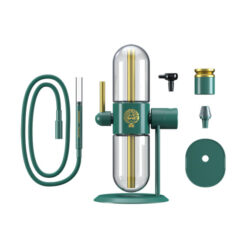In a few weeks, it will be four years since the Constitutional Court (ConCourt) passed a ruling to decriminalize cannabis. The ConCourt ruled that the criminalization of home use and cultivation of cannabis by adults as stipulated in the Drugs Act of 1992 and Medicines Act of 1965 was unconstitutional. Although growing, using and being in possession of cannabis may no longer be a criminal offense, there are still a lot of laws to draft as the Cannabis for private purposes bill leaves a lot of questions unanswered, especially in terms of commercialization.
Decriminalization timeline
Prior to 2016, cannabis was classified as a schedule 7 substance, and thus it was illegal to grow, use, be in possession of and distribute cannabis or cannabis infused products. After years of intense debate and clinical research, cannabis was reclassified, with a clear distinction being made between CBD and THC.
A short two years after it was reclassified, in 2018, the Cannabis for private purposes bill was passed. The bill in short states that an adult may use, cultivate, be in possession of and distribute (within legal limits and without remuneration) cannabis for medicinal or recreational purposes within their private dwelling. The Covid pandemic delayed any changes or discussions about the bill until August 2021, when the Department of Health voiced its concerns about the bill regarding its ambiguity towards minors and non-cannabis users. This sparked calls for the bill to be revised, focusing on commercialization and public safety for non-cannabis users and minors.
As of March 2022, the bill is set to be revised to address commercialization for recreational use, as well as provide for the growing, possession and distribution of cannabis by organizations for religious and cultural purposes. Although the Bill currently has no provision for the commercialization of cannabis, it is a certainty that it intends to address this.
It is also unclear exactly how the Bill will address the concerns raised by the Department of Health regarding public safety issues for minors and non-cannabis users. The questions raised regarding public safety are extremely valid and despite currently not having any indication as to when or how these concerns will be addressed, it is safe to assume that they definitely will be, if this Bill is to be successfully upheld.
Who stands to benefit from the recent and intended changes to the Bill?
Both cannabis users and non-cannabis users stand to benefit from the recent and intended changes to the Bill. Both groups will have a clearer understanding of what is and isn’t legal. In addition to that, the issue of commercialization and distribution by organizations for cultural and religious purposes will be addressed. This means that it will become clearer exactly how people can go about buying and selling cannabis plants and cannabis products specifically for religious and cultural purposes. Now, we know what you are thinking: Does this mean dispensaries are going to be popping up everywhere? If so, how will the law differentiate between religious and cultural purposes from the rest? Hopefully the revisions will be clear on this.
Another group that stands to benefit greatly is the agricultural sector. Addressing the issue surrounding commercialization will be highly beneficial for small farmers or whoever has land and the resources to go into growing cannabis for commercial purposes. On 27 May 2022, as issued by the Presidency, the Country Investment Strategy (CIS) stated that cannabis is recognized as a legal and globally traded agricultural commodity. Despite acknowledging this, the CIS went on to state the government still regards the commercial cultivation of cannabis for recreational use as a highly uncertain value proposition. More extensive legal and institutional growth is required, both locally and internationally.
Furthermore, given the country’s agricultural competitiveness profile, the CIS believes that commercialization of cannabis for medicinal use is a far more viable competitive sales channel to chase on an industrial level. The CIS also believes that the infrastructure to rapidly develop and produce medicinal cannabis can be used to service the recreational demand for both the local and international markets.
Currently, the path to register to be a medicinal cannabis vendor is strenuous and requires multiple licenses that are not just handed to anyone. This high standard of quality means that South African produced medical marijuana is among the best in the world and thus has a compelling value proposition in international markets. There is a hope that the Bill will make the commercialization of cannabis both for medicinal and recreational purposes a little more accessible, which will undoubtedly boost the economy.
It is important to note that, as the laws surrounding commercialization become clearer, more will have to be done to ensure that the laws and regulations don’t form a barrier to entry for rural cultivators and small medicinal manufacturers.
What now?
Now, it is important to remember that the laws around cannabis, its use and commercialization are currently being written and reviewed. As such, there is a lot of uncertainty, with more questions than answers on both sides of the aisle. This Bill affects more than cannabis users, as it will also shed some light on how the agricultural aspect of this can be explored, which will ultimately boost the economy.
There is a level of difficulty associated with drafting and passing new laws, especially on an issue that was once considered illegal. Lawmakers need to walk the thin line of granting one group of people the right to freely use cannabis for medicinal or recreational purposes without endangering and infringing on the rights of minors and non-cannabis users. It’s a delicate balance and in the end, both sides need to be relatively satisfied.
It is safe to say that we can expect many more revisions and changes to the Bill for the foreseeable future. Furthermore, it is going to take a few more years for all the aspects surrounding cannabis to be addressed. All we can do is wait to see what the lawmakers decide.









